Analyzing Cultural Dimensions: Huawei's Expansion into South Africa
VerifiedAdded on 2023/05/30
|11
|1757
|417
Report
AI Summary
This report analyzes the cultural dimensions relevant to Huawei's expansion into South Africa, drawing upon Hofstede's cultural dimensions theory. It compares China's cultural profile with that of Poland and South Africa, focusing on power distance, individualism versus collectivism, and masculinity versus femininity. The report provides recommendations for Huawei, emphasizing competitive advantage, individualistic marketing approaches, and leveraging the indulgence-oriented culture of South Africa. These recommendations include focusing on product differentiation, innovation, and creating customer perception through leisure and personal benefits. The report concludes that understanding and adapting to the cultural nuances of the host country are crucial for Huawei's successful expansion, recommending a focus on customer desires, individual needs, and competitive strategies to thrive in the South African market. Desklib offers similar solved assignments for students.
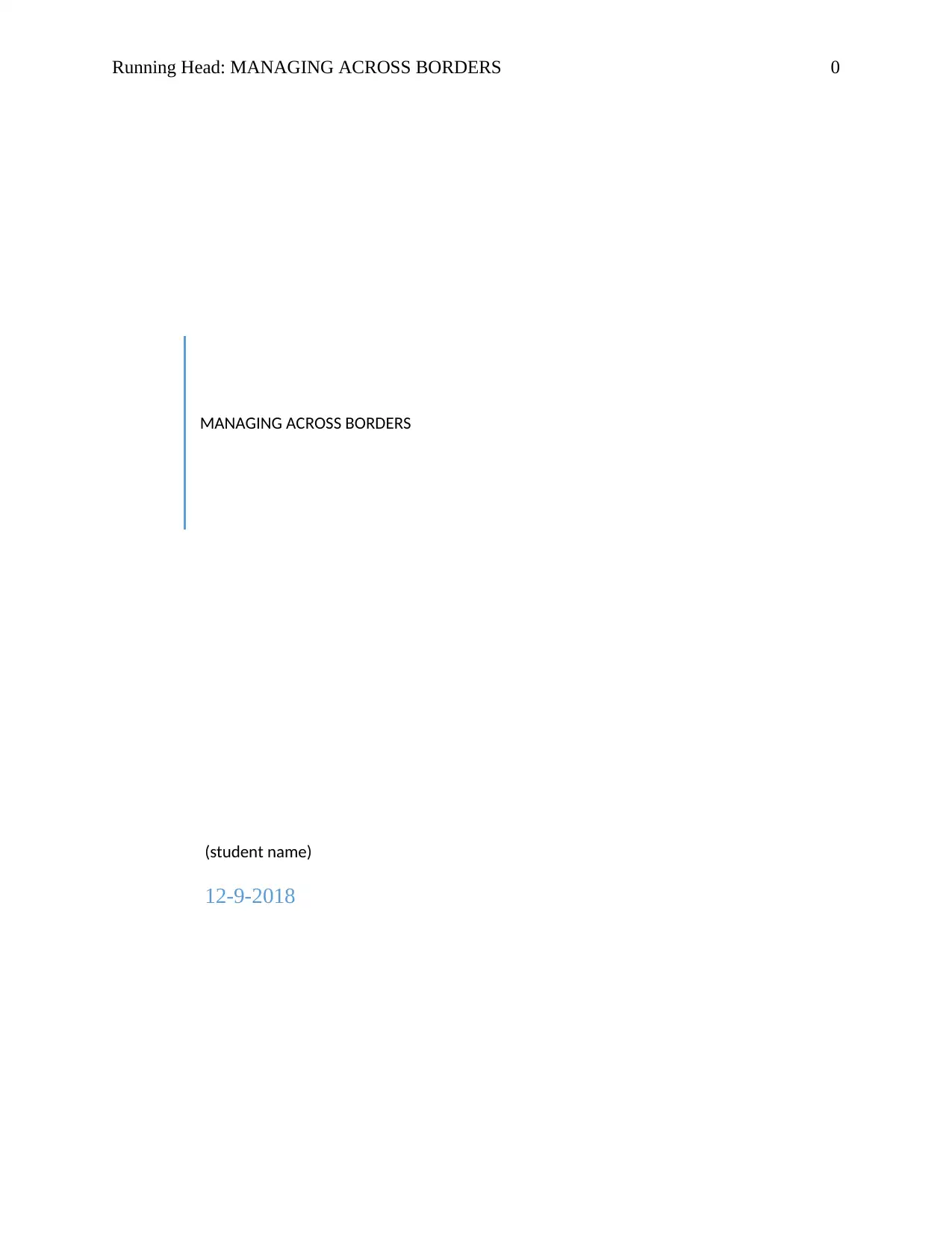
Running Head: MANAGING ACROSS BORDERS 0
MANAGING ACROSS BORDERS
(student name)
12-9-2018
MANAGING ACROSS BORDERS
(student name)
12-9-2018
Paraphrase This Document
Need a fresh take? Get an instant paraphrase of this document with our AI Paraphraser
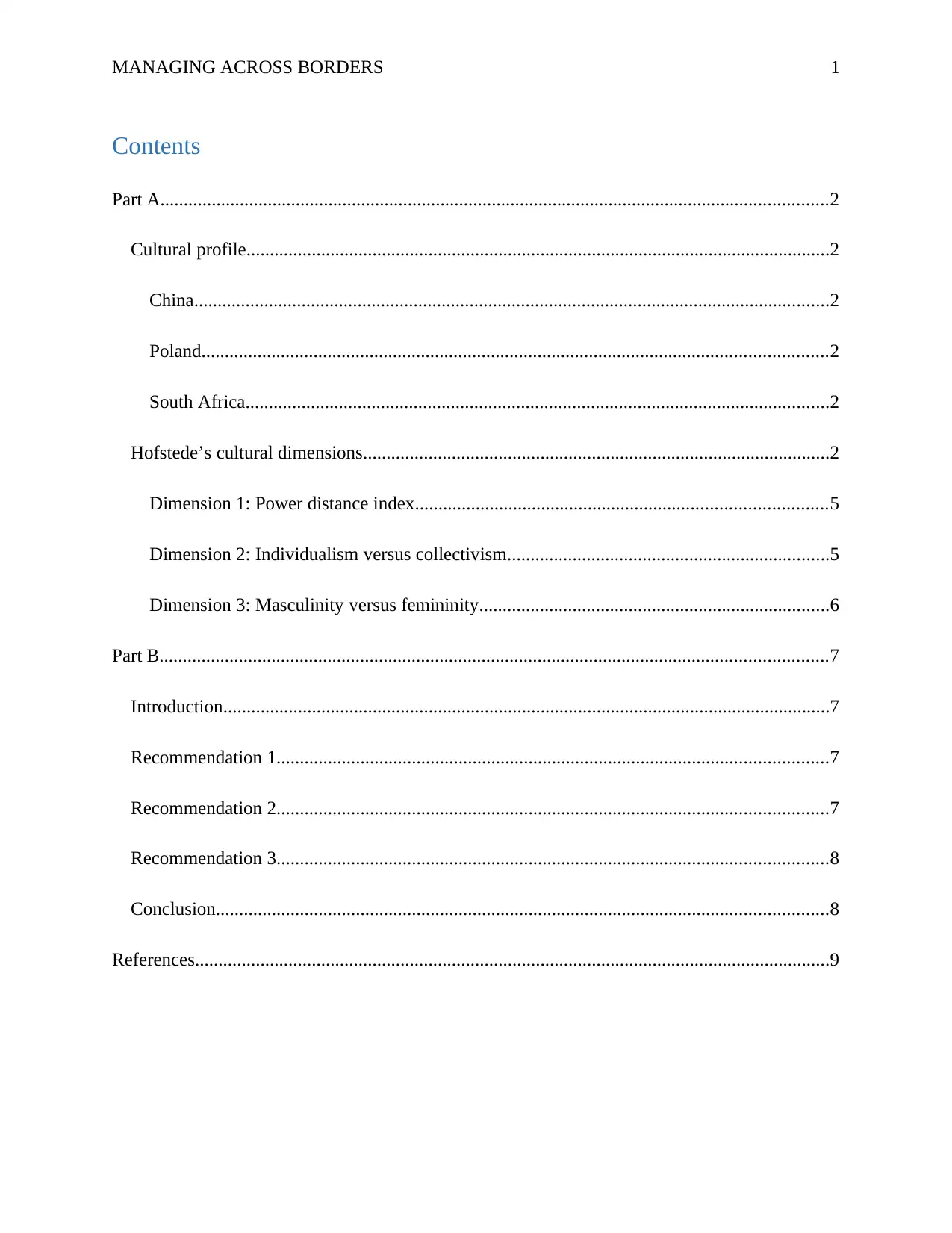
MANAGING ACROSS BORDERS 1
Contents
Part A...............................................................................................................................................2
Cultural profile.............................................................................................................................2
China........................................................................................................................................2
Poland......................................................................................................................................2
South Africa.............................................................................................................................2
Hofstede’s cultural dimensions....................................................................................................2
Dimension 1: Power distance index........................................................................................5
Dimension 2: Individualism versus collectivism.....................................................................5
Dimension 3: Masculinity versus femininity...........................................................................6
Part B...............................................................................................................................................7
Introduction..................................................................................................................................7
Recommendation 1......................................................................................................................7
Recommendation 2......................................................................................................................7
Recommendation 3......................................................................................................................8
Conclusion...................................................................................................................................8
References........................................................................................................................................9
Contents
Part A...............................................................................................................................................2
Cultural profile.............................................................................................................................2
China........................................................................................................................................2
Poland......................................................................................................................................2
South Africa.............................................................................................................................2
Hofstede’s cultural dimensions....................................................................................................2
Dimension 1: Power distance index........................................................................................5
Dimension 2: Individualism versus collectivism.....................................................................5
Dimension 3: Masculinity versus femininity...........................................................................6
Part B...............................................................................................................................................7
Introduction..................................................................................................................................7
Recommendation 1......................................................................................................................7
Recommendation 2......................................................................................................................7
Recommendation 3......................................................................................................................8
Conclusion...................................................................................................................................8
References........................................................................................................................................9
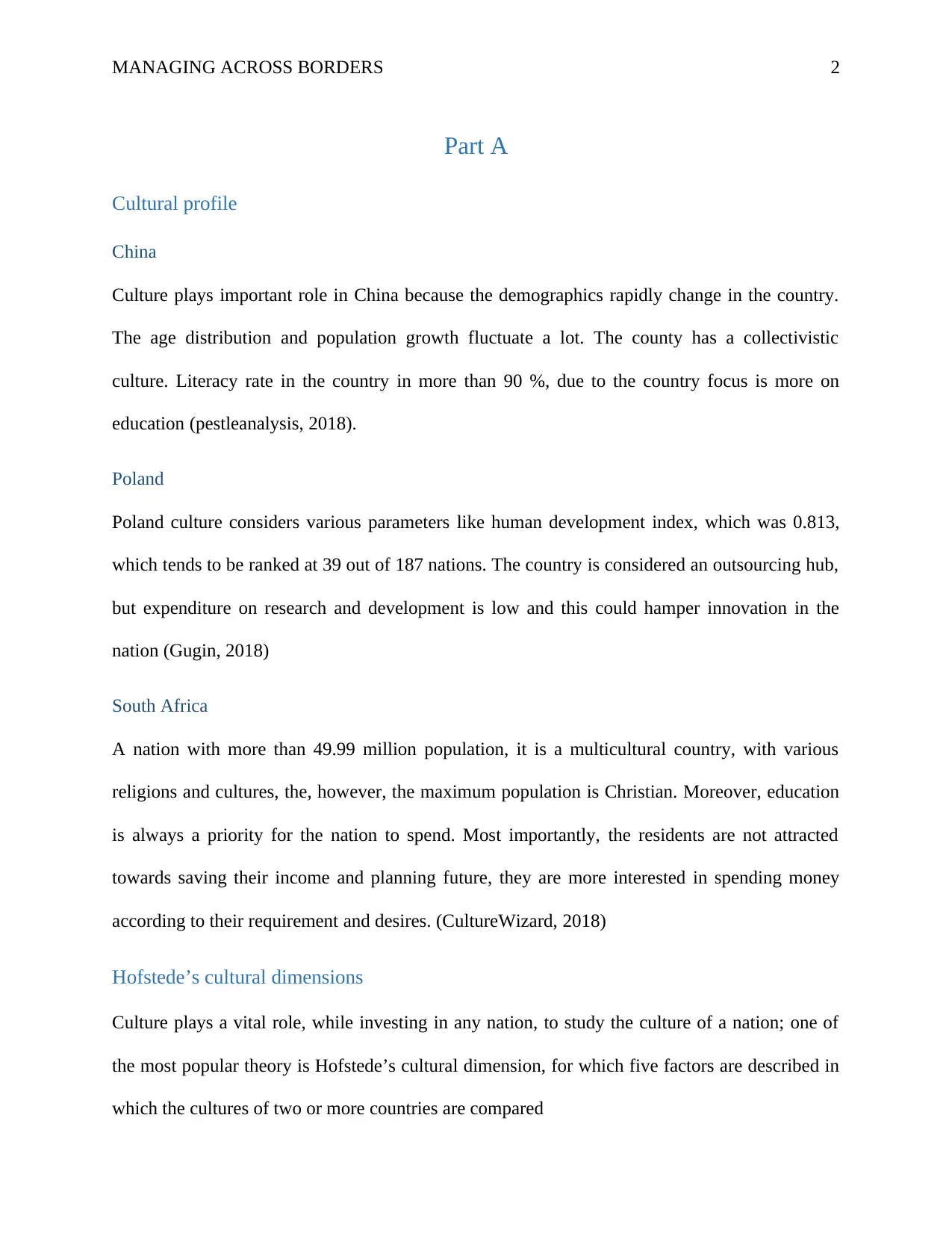
MANAGING ACROSS BORDERS 2
Part A
Cultural profile
China
Culture plays important role in China because the demographics rapidly change in the country.
The age distribution and population growth fluctuate a lot. The county has a collectivistic
culture. Literacy rate in the country in more than 90 %, due to the country focus is more on
education (pestleanalysis, 2018).
Poland
Poland culture considers various parameters like human development index, which was 0.813,
which tends to be ranked at 39 out of 187 nations. The country is considered an outsourcing hub,
but expenditure on research and development is low and this could hamper innovation in the
nation (Gugin, 2018)
South Africa
A nation with more than 49.99 million population, it is a multicultural country, with various
religions and cultures, the, however, the maximum population is Christian. Moreover, education
is always a priority for the nation to spend. Most importantly, the residents are not attracted
towards saving their income and planning future, they are more interested in spending money
according to their requirement and desires. (CultureWizard, 2018)
Hofstede’s cultural dimensions
Culture plays a vital role, while investing in any nation, to study the culture of a nation; one of
the most popular theory is Hofstede’s cultural dimension, for which five factors are described in
which the cultures of two or more countries are compared
Part A
Cultural profile
China
Culture plays important role in China because the demographics rapidly change in the country.
The age distribution and population growth fluctuate a lot. The county has a collectivistic
culture. Literacy rate in the country in more than 90 %, due to the country focus is more on
education (pestleanalysis, 2018).
Poland
Poland culture considers various parameters like human development index, which was 0.813,
which tends to be ranked at 39 out of 187 nations. The country is considered an outsourcing hub,
but expenditure on research and development is low and this could hamper innovation in the
nation (Gugin, 2018)
South Africa
A nation with more than 49.99 million population, it is a multicultural country, with various
religions and cultures, the, however, the maximum population is Christian. Moreover, education
is always a priority for the nation to spend. Most importantly, the residents are not attracted
towards saving their income and planning future, they are more interested in spending money
according to their requirement and desires. (CultureWizard, 2018)
Hofstede’s cultural dimensions
Culture plays a vital role, while investing in any nation, to study the culture of a nation; one of
the most popular theory is Hofstede’s cultural dimension, for which five factors are described in
which the cultures of two or more countries are compared
⊘ This is a preview!⊘
Do you want full access?
Subscribe today to unlock all pages.

Trusted by 1+ million students worldwide
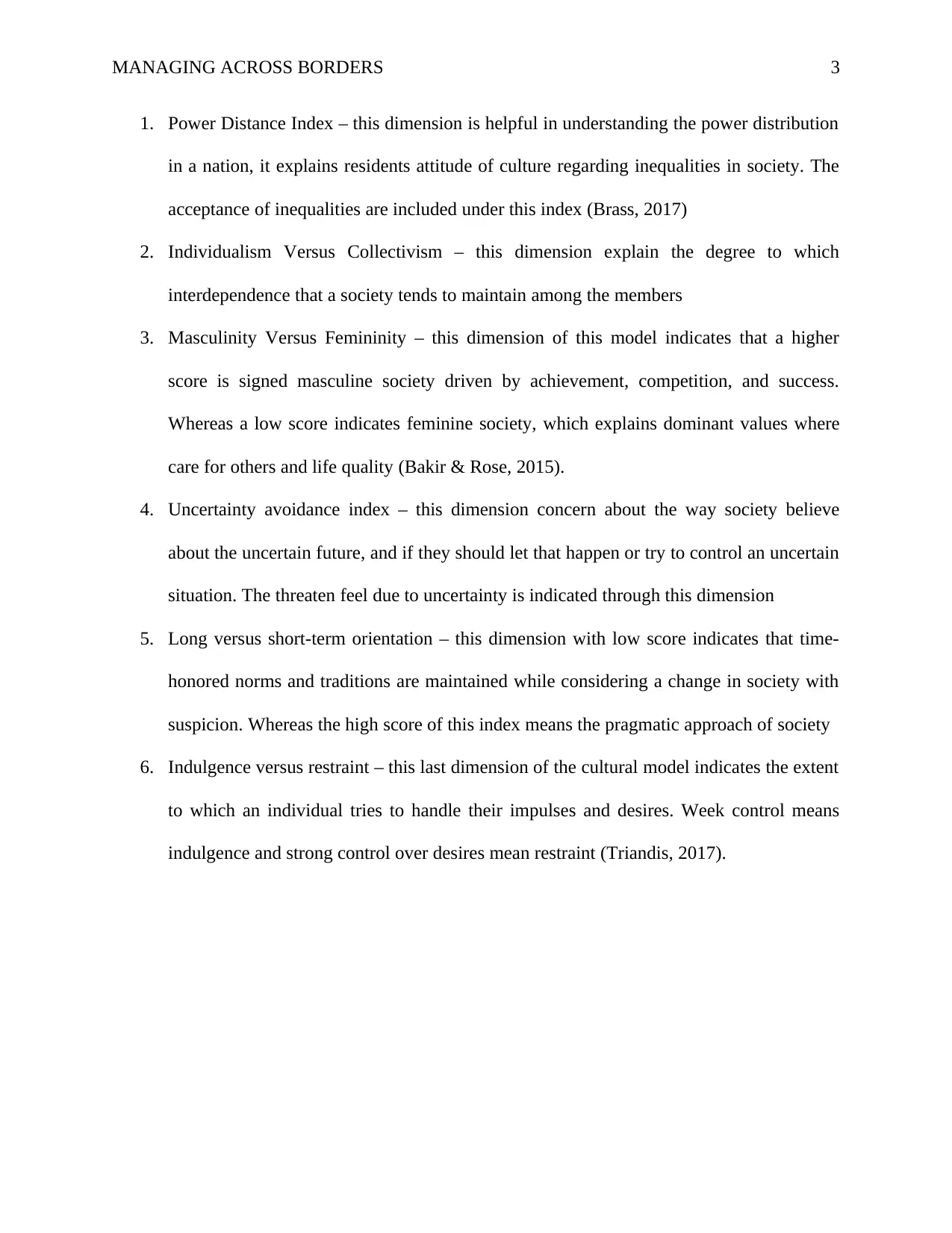
MANAGING ACROSS BORDERS 3
1. Power Distance Index – this dimension is helpful in understanding the power distribution
in a nation, it explains residents attitude of culture regarding inequalities in society. The
acceptance of inequalities are included under this index (Brass, 2017)
2. Individualism Versus Collectivism – this dimension explain the degree to which
interdependence that a society tends to maintain among the members
3. Masculinity Versus Femininity – this dimension of this model indicates that a higher
score is signed masculine society driven by achievement, competition, and success.
Whereas a low score indicates feminine society, which explains dominant values where
care for others and life quality (Bakir & Rose, 2015).
4. Uncertainty avoidance index – this dimension concern about the way society believe
about the uncertain future, and if they should let that happen or try to control an uncertain
situation. The threaten feel due to uncertainty is indicated through this dimension
5. Long versus short-term orientation – this dimension with low score indicates that time-
honored norms and traditions are maintained while considering a change in society with
suspicion. Whereas the high score of this index means the pragmatic approach of society
6. Indulgence versus restraint – this last dimension of the cultural model indicates the extent
to which an individual tries to handle their impulses and desires. Week control means
indulgence and strong control over desires mean restraint (Triandis, 2017).
1. Power Distance Index – this dimension is helpful in understanding the power distribution
in a nation, it explains residents attitude of culture regarding inequalities in society. The
acceptance of inequalities are included under this index (Brass, 2017)
2. Individualism Versus Collectivism – this dimension explain the degree to which
interdependence that a society tends to maintain among the members
3. Masculinity Versus Femininity – this dimension of this model indicates that a higher
score is signed masculine society driven by achievement, competition, and success.
Whereas a low score indicates feminine society, which explains dominant values where
care for others and life quality (Bakir & Rose, 2015).
4. Uncertainty avoidance index – this dimension concern about the way society believe
about the uncertain future, and if they should let that happen or try to control an uncertain
situation. The threaten feel due to uncertainty is indicated through this dimension
5. Long versus short-term orientation – this dimension with low score indicates that time-
honored norms and traditions are maintained while considering a change in society with
suspicion. Whereas the high score of this index means the pragmatic approach of society
6. Indulgence versus restraint – this last dimension of the cultural model indicates the extent
to which an individual tries to handle their impulses and desires. Week control means
indulgence and strong control over desires mean restraint (Triandis, 2017).
Paraphrase This Document
Need a fresh take? Get an instant paraphrase of this document with our AI Paraphraser
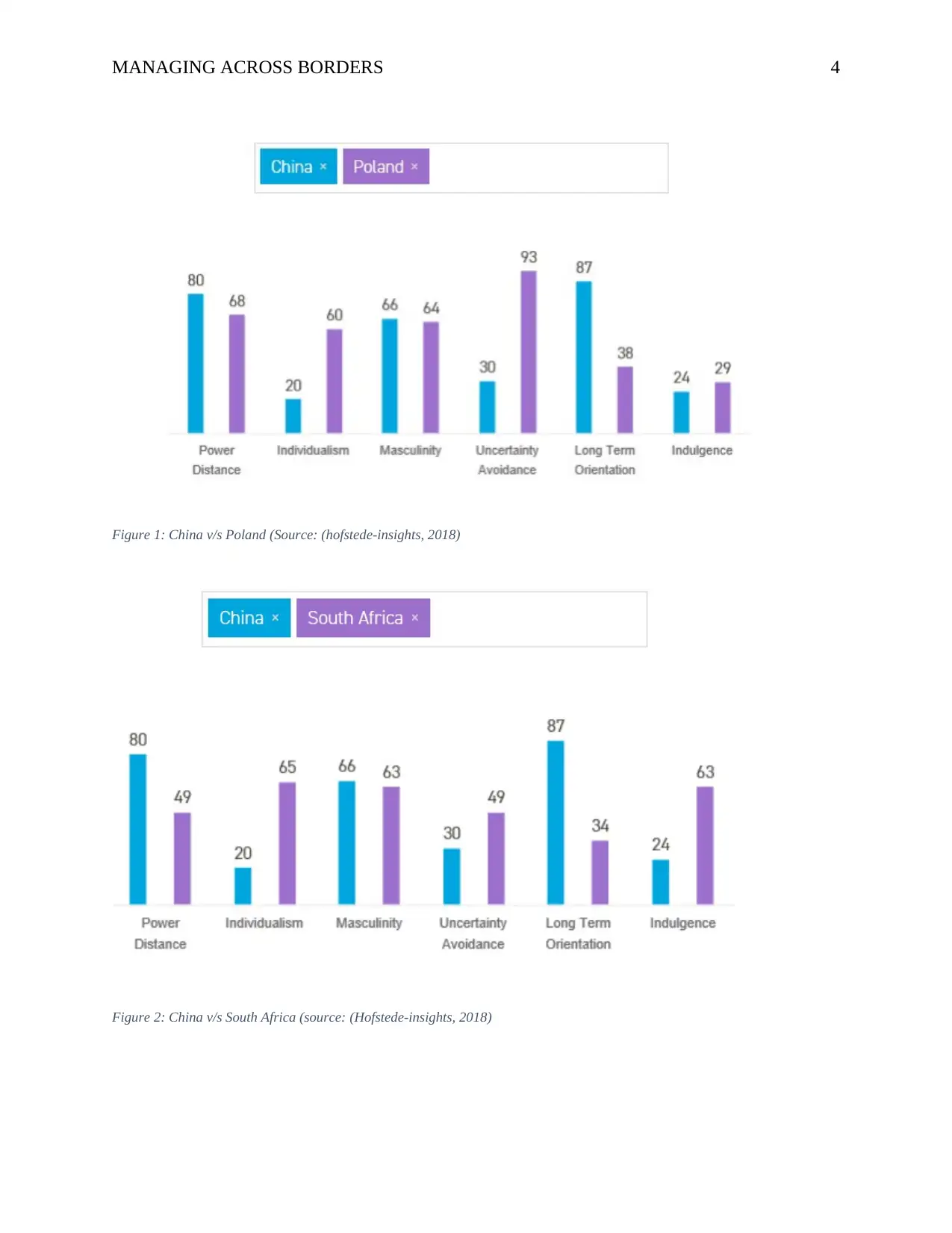
MANAGING ACROSS BORDERS 4
Figure 1: China v/s Poland (Source: (hofstede-insights, 2018)
Figure 2: China v/s South Africa (source: (Hofstede-insights, 2018)
Figure 1: China v/s Poland (Source: (hofstede-insights, 2018)
Figure 2: China v/s South Africa (source: (Hofstede-insights, 2018)
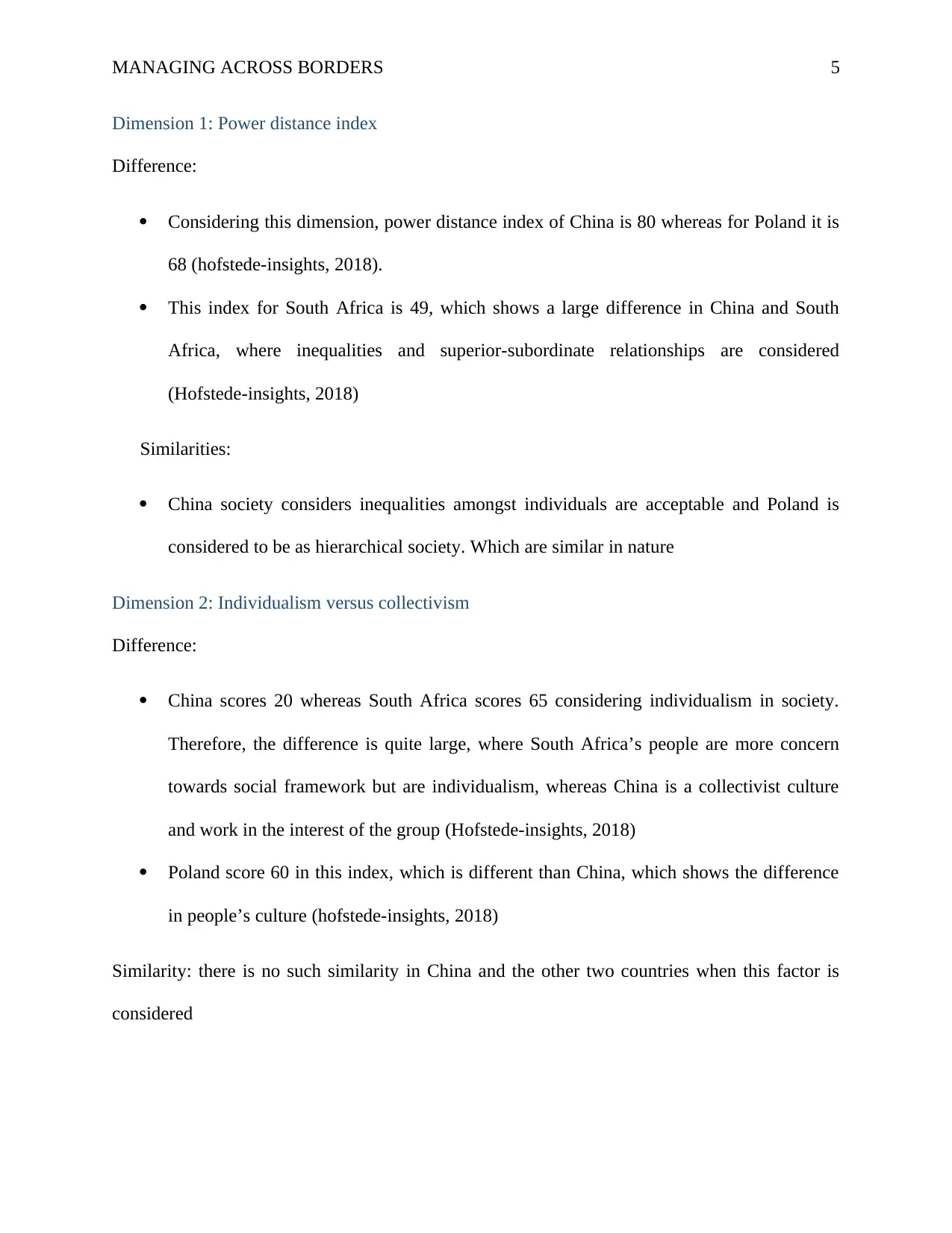
MANAGING ACROSS BORDERS 5
Dimension 1: Power distance index
Difference:
Considering this dimension, power distance index of China is 80 whereas for Poland it is
68 (hofstede-insights, 2018).
This index for South Africa is 49, which shows a large difference in China and South
Africa, where inequalities and superior-subordinate relationships are considered
(Hofstede-insights, 2018)
Similarities:
China society considers inequalities amongst individuals are acceptable and Poland is
considered to be as hierarchical society. Which are similar in nature
Dimension 2: Individualism versus collectivism
Difference:
China scores 20 whereas South Africa scores 65 considering individualism in society.
Therefore, the difference is quite large, where South Africa’s people are more concern
towards social framework but are individualism, whereas China is a collectivist culture
and work in the interest of the group (Hofstede-insights, 2018)
Poland score 60 in this index, which is different than China, which shows the difference
in people’s culture (hofstede-insights, 2018)
Similarity: there is no such similarity in China and the other two countries when this factor is
considered
Dimension 1: Power distance index
Difference:
Considering this dimension, power distance index of China is 80 whereas for Poland it is
68 (hofstede-insights, 2018).
This index for South Africa is 49, which shows a large difference in China and South
Africa, where inequalities and superior-subordinate relationships are considered
(Hofstede-insights, 2018)
Similarities:
China society considers inequalities amongst individuals are acceptable and Poland is
considered to be as hierarchical society. Which are similar in nature
Dimension 2: Individualism versus collectivism
Difference:
China scores 20 whereas South Africa scores 65 considering individualism in society.
Therefore, the difference is quite large, where South Africa’s people are more concern
towards social framework but are individualism, whereas China is a collectivist culture
and work in the interest of the group (Hofstede-insights, 2018)
Poland score 60 in this index, which is different than China, which shows the difference
in people’s culture (hofstede-insights, 2018)
Similarity: there is no such similarity in China and the other two countries when this factor is
considered
⊘ This is a preview!⊘
Do you want full access?
Subscribe today to unlock all pages.

Trusted by 1+ million students worldwide
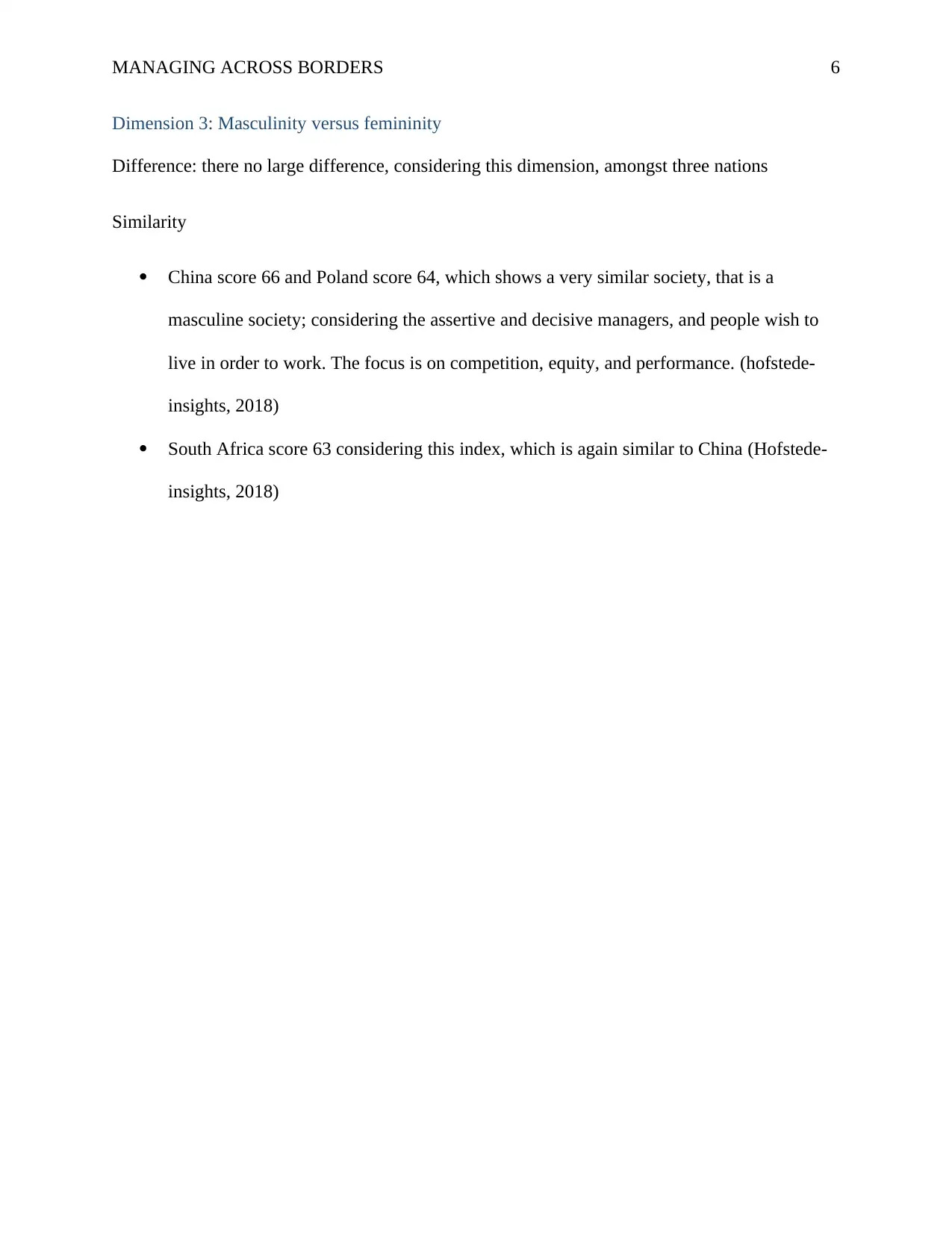
MANAGING ACROSS BORDERS 6
Dimension 3: Masculinity versus femininity
Difference: there no large difference, considering this dimension, amongst three nations
Similarity
China score 66 and Poland score 64, which shows a very similar society, that is a
masculine society; considering the assertive and decisive managers, and people wish to
live in order to work. The focus is on competition, equity, and performance. (hofstede-
insights, 2018)
South Africa score 63 considering this index, which is again similar to China (Hofstede-
insights, 2018)
Dimension 3: Masculinity versus femininity
Difference: there no large difference, considering this dimension, amongst three nations
Similarity
China score 66 and Poland score 64, which shows a very similar society, that is a
masculine society; considering the assertive and decisive managers, and people wish to
live in order to work. The focus is on competition, equity, and performance. (hofstede-
insights, 2018)
South Africa score 63 considering this index, which is again similar to China (Hofstede-
insights, 2018)
Paraphrase This Document
Need a fresh take? Get an instant paraphrase of this document with our AI Paraphraser
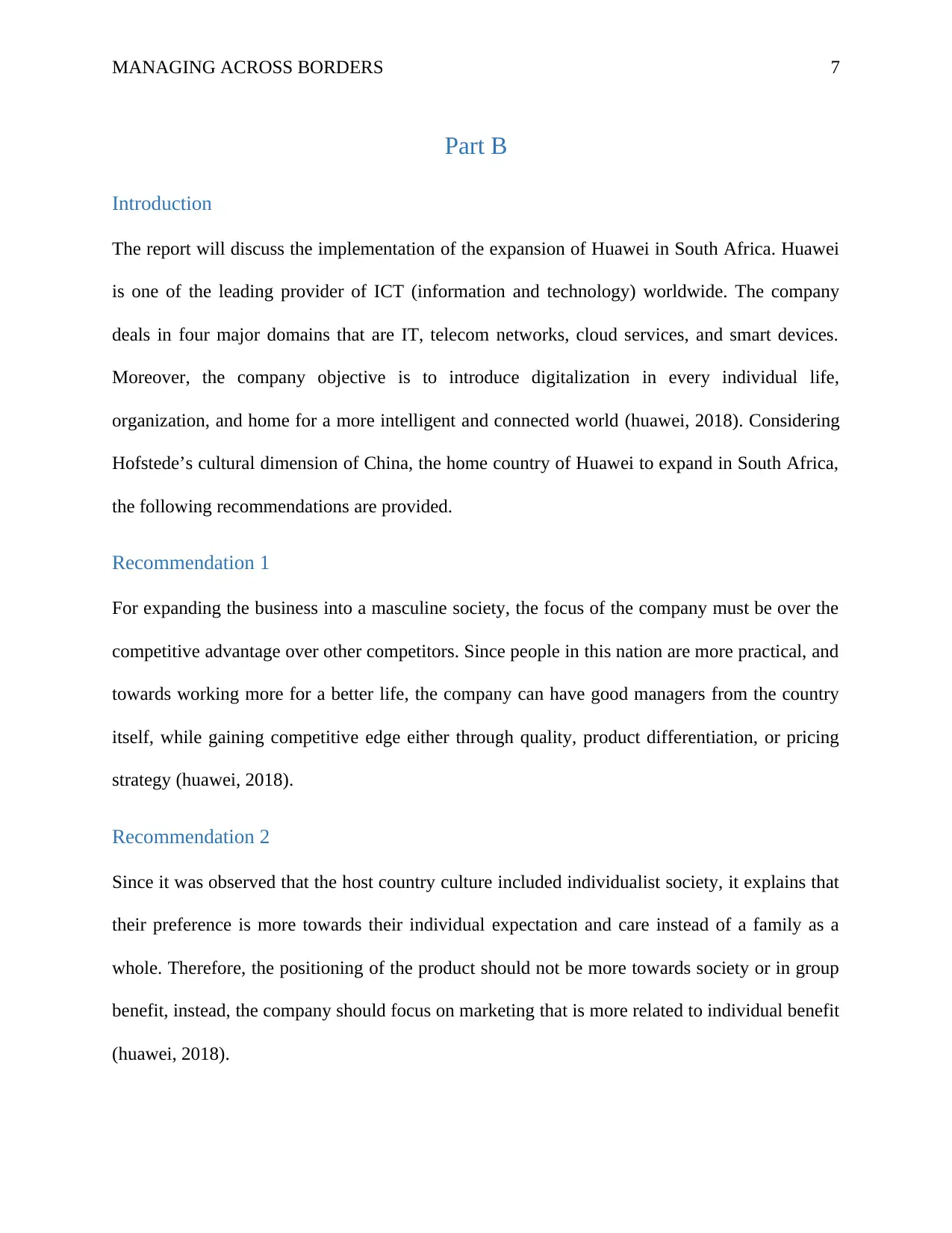
MANAGING ACROSS BORDERS 7
Part B
Introduction
The report will discuss the implementation of the expansion of Huawei in South Africa. Huawei
is one of the leading provider of ICT (information and technology) worldwide. The company
deals in four major domains that are IT, telecom networks, cloud services, and smart devices.
Moreover, the company objective is to introduce digitalization in every individual life,
organization, and home for a more intelligent and connected world (huawei, 2018). Considering
Hofstede’s cultural dimension of China, the home country of Huawei to expand in South Africa,
the following recommendations are provided.
Recommendation 1
For expanding the business into a masculine society, the focus of the company must be over the
competitive advantage over other competitors. Since people in this nation are more practical, and
towards working more for a better life, the company can have good managers from the country
itself, while gaining competitive edge either through quality, product differentiation, or pricing
strategy (huawei, 2018).
Recommendation 2
Since it was observed that the host country culture included individualist society, it explains that
their preference is more towards their individual expectation and care instead of a family as a
whole. Therefore, the positioning of the product should not be more towards society or in group
benefit, instead, the company should focus on marketing that is more related to individual benefit
(huawei, 2018).
Part B
Introduction
The report will discuss the implementation of the expansion of Huawei in South Africa. Huawei
is one of the leading provider of ICT (information and technology) worldwide. The company
deals in four major domains that are IT, telecom networks, cloud services, and smart devices.
Moreover, the company objective is to introduce digitalization in every individual life,
organization, and home for a more intelligent and connected world (huawei, 2018). Considering
Hofstede’s cultural dimension of China, the home country of Huawei to expand in South Africa,
the following recommendations are provided.
Recommendation 1
For expanding the business into a masculine society, the focus of the company must be over the
competitive advantage over other competitors. Since people in this nation are more practical, and
towards working more for a better life, the company can have good managers from the country
itself, while gaining competitive edge either through quality, product differentiation, or pricing
strategy (huawei, 2018).
Recommendation 2
Since it was observed that the host country culture included individualist society, it explains that
their preference is more towards their individual expectation and care instead of a family as a
whole. Therefore, the positioning of the product should not be more towards society or in group
benefit, instead, the company should focus on marketing that is more related to individual benefit
(huawei, 2018).
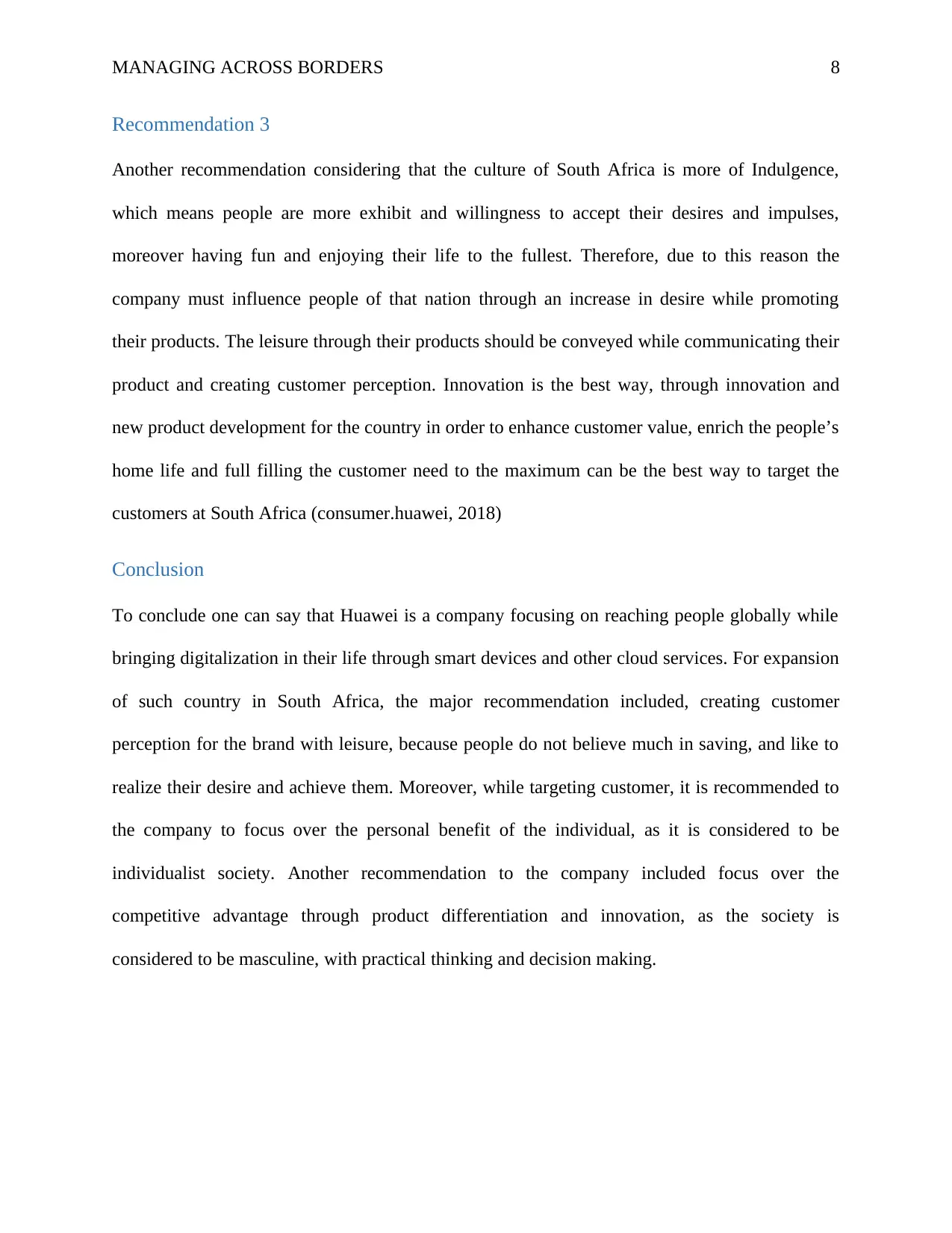
MANAGING ACROSS BORDERS 8
Recommendation 3
Another recommendation considering that the culture of South Africa is more of Indulgence,
which means people are more exhibit and willingness to accept their desires and impulses,
moreover having fun and enjoying their life to the fullest. Therefore, due to this reason the
company must influence people of that nation through an increase in desire while promoting
their products. The leisure through their products should be conveyed while communicating their
product and creating customer perception. Innovation is the best way, through innovation and
new product development for the country in order to enhance customer value, enrich the people’s
home life and full filling the customer need to the maximum can be the best way to target the
customers at South Africa (consumer.huawei, 2018)
Conclusion
To conclude one can say that Huawei is a company focusing on reaching people globally while
bringing digitalization in their life through smart devices and other cloud services. For expansion
of such country in South Africa, the major recommendation included, creating customer
perception for the brand with leisure, because people do not believe much in saving, and like to
realize their desire and achieve them. Moreover, while targeting customer, it is recommended to
the company to focus over the personal benefit of the individual, as it is considered to be
individualist society. Another recommendation to the company included focus over the
competitive advantage through product differentiation and innovation, as the society is
considered to be masculine, with practical thinking and decision making.
Recommendation 3
Another recommendation considering that the culture of South Africa is more of Indulgence,
which means people are more exhibit and willingness to accept their desires and impulses,
moreover having fun and enjoying their life to the fullest. Therefore, due to this reason the
company must influence people of that nation through an increase in desire while promoting
their products. The leisure through their products should be conveyed while communicating their
product and creating customer perception. Innovation is the best way, through innovation and
new product development for the country in order to enhance customer value, enrich the people’s
home life and full filling the customer need to the maximum can be the best way to target the
customers at South Africa (consumer.huawei, 2018)
Conclusion
To conclude one can say that Huawei is a company focusing on reaching people globally while
bringing digitalization in their life through smart devices and other cloud services. For expansion
of such country in South Africa, the major recommendation included, creating customer
perception for the brand with leisure, because people do not believe much in saving, and like to
realize their desire and achieve them. Moreover, while targeting customer, it is recommended to
the company to focus over the personal benefit of the individual, as it is considered to be
individualist society. Another recommendation to the company included focus over the
competitive advantage through product differentiation and innovation, as the society is
considered to be masculine, with practical thinking and decision making.
⊘ This is a preview!⊘
Do you want full access?
Subscribe today to unlock all pages.

Trusted by 1+ million students worldwide
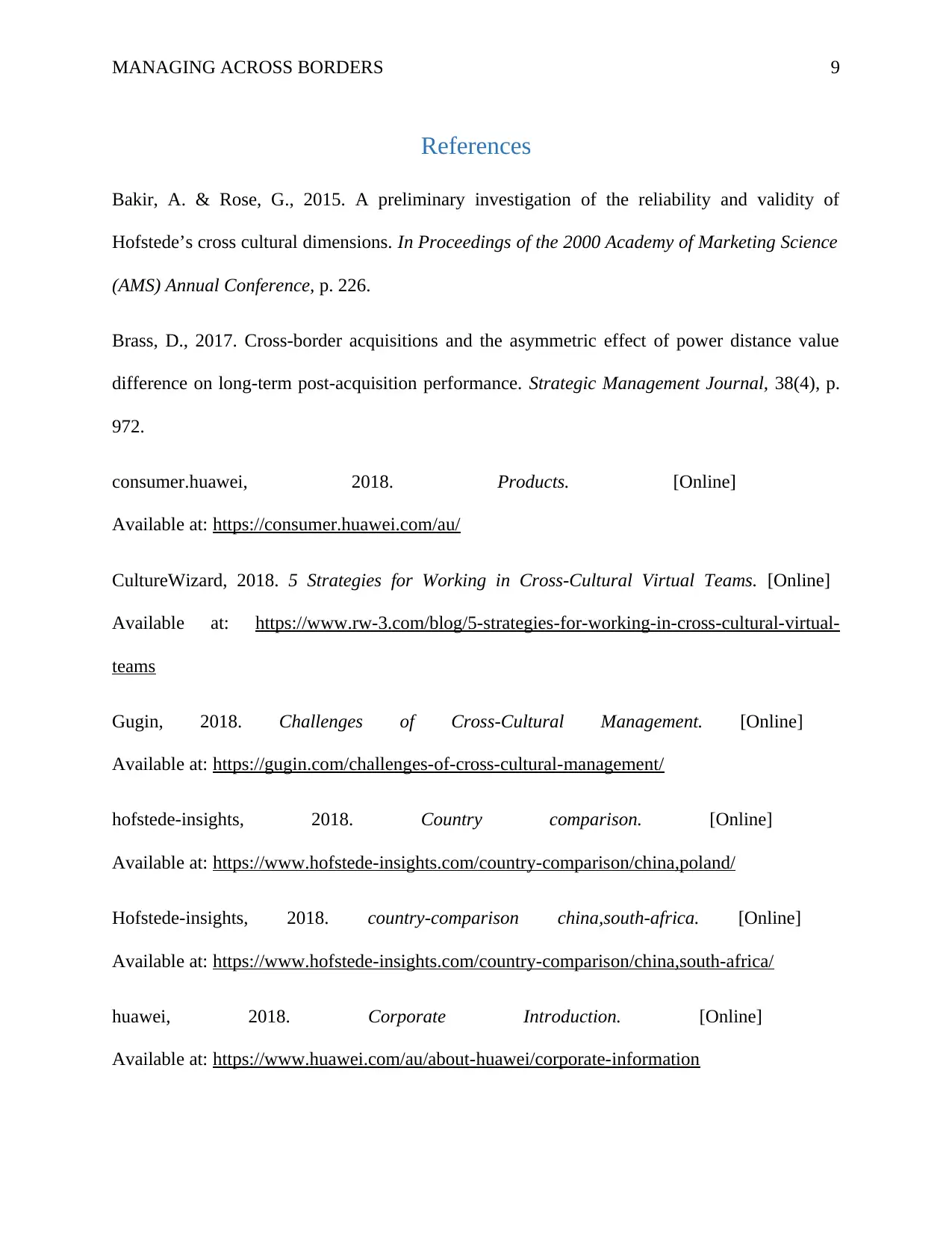
MANAGING ACROSS BORDERS 9
References
Bakir, A. & Rose, G., 2015. A preliminary investigation of the reliability and validity of
Hofstede’s cross cultural dimensions. In Proceedings of the 2000 Academy of Marketing Science
(AMS) Annual Conference, p. 226.
Brass, D., 2017. Cross‐border acquisitions and the asymmetric effect of power distance value
difference on long‐term post‐acquisition performance. Strategic Management Journal, 38(4), p.
972.
consumer.huawei, 2018. Products. [Online]
Available at: https://consumer.huawei.com/au/
CultureWizard, 2018. 5 Strategies for Working in Cross-Cultural Virtual Teams. [Online]
Available at: https://www.rw-3.com/blog/5-strategies-for-working-in-cross-cultural-virtual-
teams
Gugin, 2018. Challenges of Cross-Cultural Management. [Online]
Available at: https://gugin.com/challenges-of-cross-cultural-management/
hofstede-insights, 2018. Country comparison. [Online]
Available at: https://www.hofstede-insights.com/country-comparison/china,poland/
Hofstede-insights, 2018. country-comparison china,south-africa. [Online]
Available at: https://www.hofstede-insights.com/country-comparison/china,south-africa/
huawei, 2018. Corporate Introduction. [Online]
Available at: https://www.huawei.com/au/about-huawei/corporate-information
References
Bakir, A. & Rose, G., 2015. A preliminary investigation of the reliability and validity of
Hofstede’s cross cultural dimensions. In Proceedings of the 2000 Academy of Marketing Science
(AMS) Annual Conference, p. 226.
Brass, D., 2017. Cross‐border acquisitions and the asymmetric effect of power distance value
difference on long‐term post‐acquisition performance. Strategic Management Journal, 38(4), p.
972.
consumer.huawei, 2018. Products. [Online]
Available at: https://consumer.huawei.com/au/
CultureWizard, 2018. 5 Strategies for Working in Cross-Cultural Virtual Teams. [Online]
Available at: https://www.rw-3.com/blog/5-strategies-for-working-in-cross-cultural-virtual-
teams
Gugin, 2018. Challenges of Cross-Cultural Management. [Online]
Available at: https://gugin.com/challenges-of-cross-cultural-management/
hofstede-insights, 2018. Country comparison. [Online]
Available at: https://www.hofstede-insights.com/country-comparison/china,poland/
Hofstede-insights, 2018. country-comparison china,south-africa. [Online]
Available at: https://www.hofstede-insights.com/country-comparison/china,south-africa/
huawei, 2018. Corporate Introduction. [Online]
Available at: https://www.huawei.com/au/about-huawei/corporate-information
Paraphrase This Document
Need a fresh take? Get an instant paraphrase of this document with our AI Paraphraser
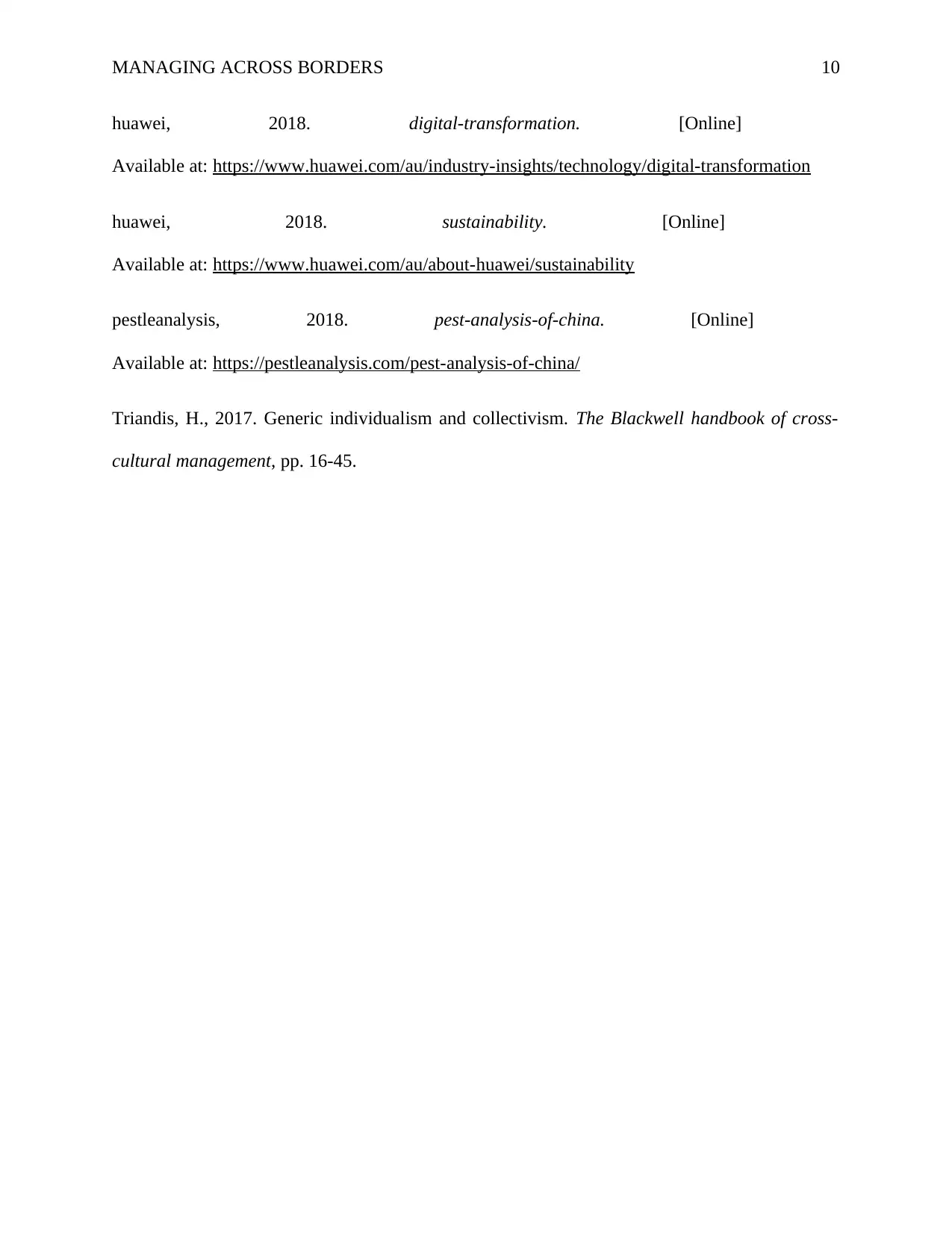
MANAGING ACROSS BORDERS 10
huawei, 2018. digital-transformation. [Online]
Available at: https://www.huawei.com/au/industry-insights/technology/digital-transformation
huawei, 2018. sustainability. [Online]
Available at: https://www.huawei.com/au/about-huawei/sustainability
pestleanalysis, 2018. pest-analysis-of-china. [Online]
Available at: https://pestleanalysis.com/pest-analysis-of-china/
Triandis, H., 2017. Generic individualism and collectivism. The Blackwell handbook of cross‐
cultural management, pp. 16-45.
huawei, 2018. digital-transformation. [Online]
Available at: https://www.huawei.com/au/industry-insights/technology/digital-transformation
huawei, 2018. sustainability. [Online]
Available at: https://www.huawei.com/au/about-huawei/sustainability
pestleanalysis, 2018. pest-analysis-of-china. [Online]
Available at: https://pestleanalysis.com/pest-analysis-of-china/
Triandis, H., 2017. Generic individualism and collectivism. The Blackwell handbook of cross‐
cultural management, pp. 16-45.
1 out of 11
Related Documents
Your All-in-One AI-Powered Toolkit for Academic Success.
+13062052269
info@desklib.com
Available 24*7 on WhatsApp / Email
![[object Object]](/_next/static/media/star-bottom.7253800d.svg)
Unlock your academic potential
Copyright © 2020–2025 A2Z Services. All Rights Reserved. Developed and managed by ZUCOL.




